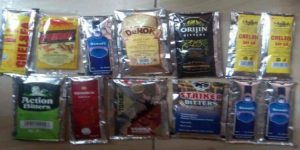
The Nigerian Association of Resident Doctors (NARD) and the National Association of Nigeria Nurses and Midwives have voiced their endorsement of the ban on the importation, manufacturing, distribution, sale, and usage of alcoholic beverages in sachets, as well as small bottles of 200ml and below.
Their support comes amidst a growing concern for the adverse effects of these products on public health.
However, contrasting this viewpoint, the Trade Union Congress (TUC) and the Nigeria Labour Congress (NLC) have continued their opposition to the ban and are now demanding the suspension of the Director-General of the National Agency for Food and Drug Administration and Control (NAFDAC), Prof. Mojisola Adeyeye. These unions, joined by various distillers in the country, argue that the ban would result in significant job losses for approximately 500,000 workers and undermine investments worth N800 billion.
Dr. Dele Abdullahi, President of NARD, empathized with the concerns raised by the labor unions regarding potential job losses. However, he emphasized the importance of considering the detrimental impact of sachet and small-bottle alcohol on both public health and family finances. Dr. Abdullahi stated, “Sachet alcohol has contributed to the impoverishment of many individuals. These affordable beverages have facilitated addiction, as they are easily accessible within the income range of a large portion of the population. Regulating the production and consumption of these products would be a significant step towards addressing this issue.”
Similarly, Michael Nnachi, President of the National Association of Nigeria Nurses and Midwives, supported NAFDAC’s decision, highlighting the need to protect Nigerians from the risks associated with adulterated alcoholic drinks. He stated, “The ban serves to curb the menace of alcohol abuse and safeguard the well-being of our society. Any product that fails to meet the recommended standards set by the World Health Organization must be addressed promptly to ensure public safety.”
Meanwhile, the TUC and NLC persist in their protest against the ban, emphasizing its potential detrimental impact on indigenous manufacturing companies. During a demonstration in Abeokuta, the Ogun State capital, Akeem Lasisi, Chairman of the Ogun State chapter of the TUC, and Hammed Ademola Benco, Chairman of the NLC, called for the suspension of NAFDAC’s Director-General, Prof. Mojisola Adeyeye. The protesters, including members of the Food Beverages and Tobacco Senior Staff Association and the National Union of Food Beverages and Tobacco Employees, gathered outside the Ogun State House of Assembly. They voiced their concerns over the ban, expressing fears of job losses and urging the preservation of local industries.
In response to the demonstrators, the Speaker of the Assembly, Oludaisi Elemide, assured them that the Assembly would intervene and advocate for reconsideration of the ban at the federal level. He stated, “While we acknowledge that the ban is a decision made by the federal government, we will convey your concerns and interests to ensure that they are duly considered.”
Following their protest, representatives from the labor unions held a closed-door meeting with Oba Adedotun Gbadebo, the Alake of Egbaland, at his palace to further discuss their grievances and seek additional support.
The ongoing debate between medical professionals supporting the sachet alcohol ban and labor unions opposing it reflects the complex considerations surrounding public health, economic concerns, and the welfare of the workforce. As the discussions continue, it remains to be seen how the government will address these conflicting viewpoints and determine the best course of action for the nation.

